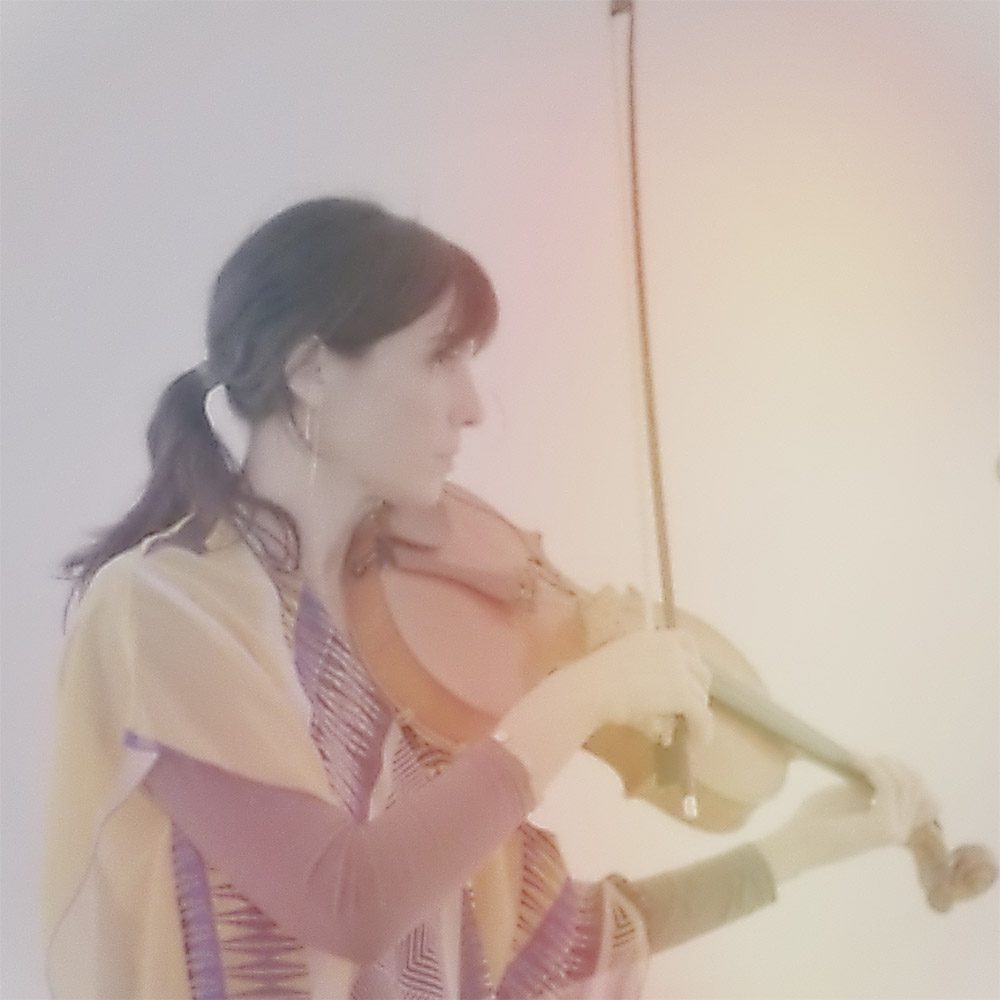“The prowess with which violist and composer Jessica Pavone creates sweeping, heartstring-tugging vistas is both cerebral and out of this world… Jessica Pavone is a freethinker who can’t be pigeonholed“
– Brad Cohen, Jazz Times
“Pavone [is] not like other composers she is uniquely herself, and from that stems the improbable strength of her music.”
-Julian Cowley, Wire Magazine
–Wire Feature by Philip Clark– NPR; Featured on WNYC New Sounds / Strings and Things
– NPR; Feature on WNYC New Sounds / Music for Bowed String Ensembles
“There are certain musicians that you can say, with confidence, could play a pair of shoes if it had strings. Jessica Pavone is certainly one. In fact, I’m pretty sure Pavone could get a good tone out of Velcro’s clogs if she so desired.”
– David Nadelle, Tiny Mix Tapes

View or download the high-resolution photo.
SHORT BIO
Queens, NY-based violist and composer, Jessica Pavone, explores the tactile and sensory experience of music as a vibration-based medium. Inspired by processes centered on intuition and instinct, her music channels these ideas by focusing on how music feels when played and heard, integrating her experiences as an instrumentalist into works that transcend time. Pavone has dedicated her practice to exploring alternative avenues for creative musical expression and “has made a career of redefining the possibilities for her instrument” (Steve Smith, National Sawdust Log). Pavone’s music has been premiered at prominent NYC venues such as: Abrons Art Center, ISSUE Project Room, the Kitchen, the Noguchi Museum, Pioneer Works, Roulette, and the Socrates Sculpture Park.
Grants and Commissions: New York State Council on the Arts (2024), Queens Arts Council (2024, 2022, 2020), New York Foundation for the Arts NYC Women’s Fund (2023), MATA Festival (2023), Foundation for Contemporary Arts (Emergency Grant, 2021), New Music USA (2015), Tri-Centric Foundation (2015), Experiments in Opera (2013), and the Jerome Foundation (2011). Residencies and Fellowships: Uncool Switzerland (2025), Herb Alpert/Ragdale Prize (2024), Hambidge Fellowship (2024), Marble House Project (2024), Kimmel Harding Nelson Center for the Arts (2024), Loghaven Fellowship (2023), Ragdale (Trager Fellow 2022), and Ucross Foundation (2020).
LONG BIO
As an instrumentalist and composer, developing original compositions for solo viola has been integral to Jessica Pavone’s work. This music informs her written practice and plays a vital role in her approach to ensemble composition. She explores the tactile and sensory experience of music as a vibration-based medium and incorporates time-based principles to shape her works. Inspired by processes centered on intuition and instinct, her music channels all these ideas by focusing on how music feels when played and heard and exploring how sonic vibrations affect the body, weaving her experiences as an instrumentalist into works that transcend time.
While her primary training was in classical music at the Hartt School of Music (B.M. Music Ed. ’98) and Brooklyn College (M.M. Music Composition ’07), Pavone has dedicated her career to exploring alternative avenues for creative musical expression and “has made a career of redefining the possibilities for her instrument” (Steve Smith, National Sawdust Log). Since studying with Leroy Jenkins from ’00-’05 and incorporating improvisation in her viola playing, Pavone has performed original music by William Parker, Henry Threadgill, Matana Roberts, Wadada Leo Smith, Aaron Siegel, Tyondai Braxton, Matthew Welch, Samantha Boshnack, Jason Cady, Elliott Sharp, and Taylor Ho Bynum. From ’05 to ’12, she toured regularly with Anthony Braxton’s Sextet and 12+1tet and appears on his discography from that time.
In 2017, Pavone created the J. Pavone String Ensemble as an expansion of her solo viola repertoire. In contrast to the traditional improvisatory approach that prizes the showmanship of the soloist, the ensemble approach focuses on a vision of collective improvisation that prioritizes a collaboratively woven musical fabric. The group has performed at the Suoni Per Il Popolo Festival (Montreal), Bang on a Can Long Play Festival (NYC), Logan Center for the Arts (Chicago), Dartmouth New Music Festival (Hanover), the Stone and the DiMenna Center for Classical Music (Manhattan), NYC Winter Jazzfest, Roulette and ISSUE Project Room (Brooklyn), Firehouse12 (New Haven), Black Mountain College Museum + Arts Center (Asheville), the Garner Arts Center (Garnerville, NY), and The Rotunda (Philadelphia). Four studio albums have been released to critical acclaim from The Wire, The New Yorker, Pitchfork, JazzTimes, and San Francisco Classical Voice. Brad Cohen of Jazz Times described her as “a free-thinker who can’t be pigeonholed.”
Grants and Commissions: New York State Council on the Arts (2024), Queens Art Fund (2024, 2022, 2020), New York Foundation for the Arts NYC Women’s Fund (2023), MATA Festival (2023), the Foundation for Contemporary Arts (Emergency Grant, 2021), New York Foundation for the Arts (City Artist Corps, 2021), New Music USA (2015), the Tri-Centric Foundation (2015), Experiments in Opera (2013), the Jerome Foundation (2011), and MATA Interval (2007).
Residencies and Fellowships: Ragdale Foundation (William and Solange Brown Fellow 2025), I-Park Foundation (2024), The Hambidge Center (Distinguished Fellow 2024), Marble House Project (2024), Kimmel Harding Nelson Center for the Arts (2024), Loghaven (2023), Stove Works (2023), Ragdale Foundation (Trager Fellow 2022), Ucross Foundation (2020), Soaring Gardens (2020), Arts Letters & Numbers (2019), and Mise-En-Place (2018).
Based in Queens, NY, Pavone has premiered new music at prominent NYC venues, including the Noguchi Museum, Abrons Art Center, the Museum of Art and Design, Pioneer Works, Socrates Sculpture Park, National Sawdust, and the Kitchen. Pavone’s albums have been produced by Tzadik, Taiga Records, Thirsty Ear, Out of Your Head Records, Astral Spirits, and Relative Pitch Records. Additionally, she has released four collaborative duo recordings with guitarist Mary Halvorson (2019 MacArthur Fellow). In 2011, she was featured in NPR’s “The Mix: 100 Composers Under 40.” The New York Times wrote that her music is distinct and beguiling; its core is steely, and its execution clear,” and in Wire Magazine, Julian Cowley noted that Pavone [is] not like other composers, she is uniquely herself, and from that stems the improbable strength of her music.“
Artist Statement:
As an instrumentalist and composer, I explore music’s tactile and sensory elements as a vibration-based medium. Inspired by processes centered on intuition and instinct, I channel these ideas into compositions by focusing on how music feels when played and heard, exploring the effects of sonic vibrations on the body, and weaving my experiences as an instrumentalist into works that transcend time. Developing original music for solo viola has been an integral part of my practice. Written documentation consists simply of timestamps charting the order in which to explore sounds, textures, and melodic material. The structured yet indeterminate pieces that I perform stem from an interest in long tones, repetition, and sympathetic vibration. This music informs my written practice and plays a vital role in my approach to ensemble composition.
My compositions borrow from and expand upon traditional music notation, alternating between metered and duration-based sections, and improvised and notated instructions. My scores prioritize an intentionally fluid style that allows musicians to sculpt aspects of the pieces by carving out open, liminal spaces, which provide freedom for reinterpretation, making each performance unique. I participate as a violist in my ensembles, whose approach focuses on a vision of collective improvisation that emphasizes a collaboratively woven fabric, in contrast to the traditional improvisatory method that prizes the showmanship of the soloist. Expanding beyond the conventional elements of music, my compositions explore textures that evoke physical and cognitive responses in both the musician and the listener. Thus, both parties play a role in the work’s development.

